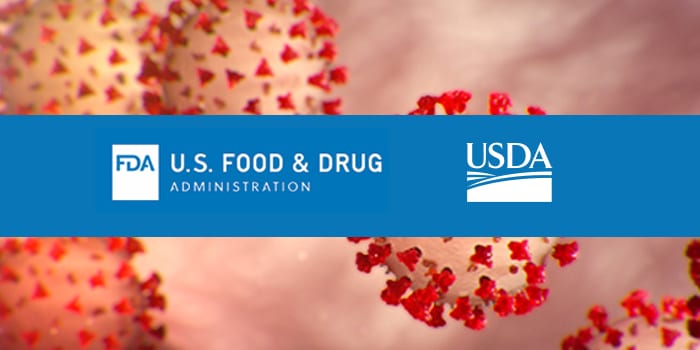FDA/USDA: Label Guidelines Loosened, ‘Essential’ Services Clarified

As many foodservice operations cease or dramatically reduce their footprint, food products originally produced and packaged for restaurants, hotels, schools and other establishments are being rerouted to retailers and wholesalers. But before feeding the surging demand in stores, they need labels that are approved for these new channels — and the Food and Drug Administration (FDA) and U.S. Department of Agriculture (USDA) are aiming to expedite the process with new guidance published this week.
Companies like Tyson Foods and Kraft Heinz are already adjusting supply lines to focus on smaller pack sizes rather than bulk foodservice items. Tyson CEO Dean Banks explained in a March 18 blog post plans to “quickly pivot” some of the company’s 100-plus plants to produce beef, chicken and pork for retail.
“Changing packaging from a foodservice product to a retail product can occur quickly because of the built-in flexibility of our operations,” he wrote.
But other manufacturers — especially those that only supply foodservice — may lack such capabilities. To help keep food flowing, the FDA and USDA are allowing retailers to label items rerouted from foodservice, a move that hopefully helps manufacturers offload excess product as well.
“Because many manufacturers practice ‘just in time’ manufacturing, they may have sufficient ingredients on hand to produce additional product, but not enough packaging materials to label the product for retail sale,” FDA wrote in yesterday’s guidance.
Additionally, restaurants can sell perishable and non-perishable food, including ingredients, directly to manufacturers and consumers even though the products use a different format for Nutrition Facts panels.
In the guidance, the FDA states the items must contain the following: no nutrition claims; a statement of identity; an ingredient statement; the name and place of business of the food manufacturer, packer, or distributor; net quantity; and allergen information required by the Food Allergen Labeling and Consumer Protection Act. Restaurants can create the labels or a manufacturer can provide them.
The guidance, however, does not apply to prepared restaurant food.
The looser restriction is possible, the agency noted, because restaurants follow similar food safety requirements as the FDA.
“We believe these requirements, which include specifications on temperature at receipt and holding specifications to ensure the food is safe and unadulterated, are adequate to ensure the safety of the food while at a restaurant, such that the food could go back into distribution,” the FDA wrote.
Similarly, the USDA’s Food Safety and Inspection Service (FSIS)’s guidance, issued Monday and covering the next 60 days, allows meat or poultry products labeled for a specific restaurant or institution (such as a school), or unlabeled with protective coverings and already in commerce, to be repackaged into smaller consumer sizes and labeled by retailers when manufacturers have not done so. These products must include all USDA Nutrition Facts components other than the USDA inspection mark.
“FSIS recognizes an immediate need to have meat and poultry products originally intended to be distributed to hotels, restaurants, and institutions to be diverted for retail sale to meet consumer demand,” a FSIS spokesperson said.
These updates were requested by industry organizations Food Industry Association (FMI) and the International Foodservice Distributors Association (IFDA), which have partnered to connect foodservice distributors with excess products and services to retailers and wholesalers.
“If we can take some product that is sitting still for foodservice, and sell it at retail, that helps everyone,” an FMI spokesperson said.
Other FDA/USDA Updates:
- As of yesterday, the FDA will not enforce its Nutrition and Supplement Facts label guidelines, which went into effect in January for companies with over $10 million in sales, for the rest of 2020. Previously, the agency had announced plans to work cooperatively with manufacturers without enforcement for six months.
- David Tuckwiller, deputy administrator of commodity procurement at USDA’s Agricultural Marketing Service (AMS), on Wednesday outlined ‘essential’ agency services that can operate in areas with shelter-in-residence restrictions. Those services include AMS, along with FSIS, Farm Service Agency, Agricultural Research Service, Animal Plant Health and Inspection Service, Natural Resources Conservation Service, and Forest Service. Halting these services “could jeopardize U.S. agriculture, food safety, and food production and supply and adversely affect the health, welfare and safety of the public,” he noted in a letter to vendors.
















